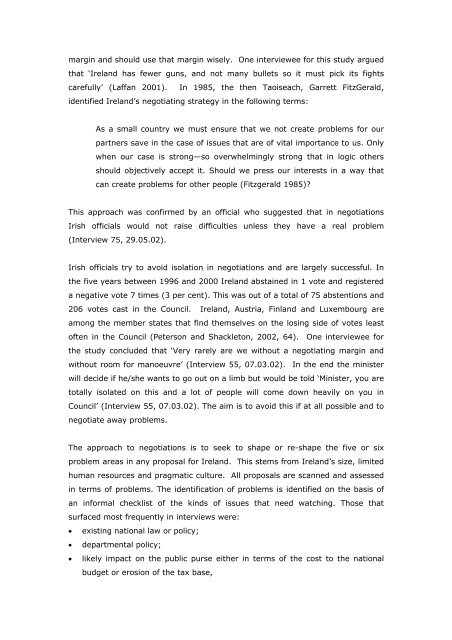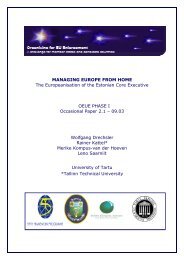Managing Europe From Home: The Europeanisation of the Irish ...
Managing Europe From Home: The Europeanisation of the Irish ...
Managing Europe From Home: The Europeanisation of the Irish ...
Create successful ePaper yourself
Turn your PDF publications into a flip-book with our unique Google optimized e-Paper software.
margin and should use that margin wisely. One interviewee for this study argued<br />
that ‘Ireland has fewer guns, and not many bullets so it must pick its fights<br />
carefully’ (Laffan 2001). In 1985, <strong>the</strong> <strong>the</strong>n Taoiseach, Garrett FitzGerald,<br />
identified Ireland’s negotiating strategy in <strong>the</strong> following terms:<br />
As a small country we must ensure that we not create problems for our<br />
partners save in <strong>the</strong> case <strong>of</strong> issues that are <strong>of</strong> vital importance to us. Only<br />
when our case is strong—so overwhelmingly strong that in logic o<strong>the</strong>rs<br />
should objectively accept it. Should we press our interests in a way that<br />
can create problems for o<strong>the</strong>r people (Fitzgerald 1985)<br />
This approach was confirmed by an <strong>of</strong>ficial who suggested that in negotiations<br />
<strong>Irish</strong> <strong>of</strong>ficials would not raise difficulties unless <strong>the</strong>y have a real problem<br />
(Interview 75, 29.05.02).<br />
<strong>Irish</strong> <strong>of</strong>ficials try to avoid isolation in negotiations and are largely successful. In<br />
<strong>the</strong> five years between 1996 and 2000 Ireland abstained in 1 vote and registered<br />
a negative vote 7 times (3 per cent). This was out <strong>of</strong> a total <strong>of</strong> 75 abstentions and<br />
206 votes cast in <strong>the</strong> Council. Ireland, Austria, Finland and Luxembourg are<br />
among <strong>the</strong> member states that find <strong>the</strong>mselves on <strong>the</strong> losing side <strong>of</strong> votes least<br />
<strong>of</strong>ten in <strong>the</strong> Council (Peterson and Shackleton, 2002, 64). One interviewee for<br />
<strong>the</strong> study concluded that ‘Very rarely are we without a negotiating margin and<br />
without room for manoeuvre’ (Interview 55, 07.03.02). In <strong>the</strong> end <strong>the</strong> minister<br />
will decide if he/she wants to go out on a limb but would be told ‘Minister, you are<br />
totally isolated on this and a lot <strong>of</strong> people will come down heavily on you in<br />
Council’ (Interview 55, 07.03.02). <strong>The</strong> aim is to avoid this if at all possible and to<br />
negotiate away problems.<br />
<strong>The</strong> approach to negotiations is to seek to shape or re-shape <strong>the</strong> five or six<br />
problem areas in any proposal for Ireland. This stems from Ireland’s size, limited<br />
human resources and pragmatic culture. All proposals are scanned and assessed<br />
in terms <strong>of</strong> problems. <strong>The</strong> identification <strong>of</strong> problems is identified on <strong>the</strong> basis <strong>of</strong><br />
an informal checklist <strong>of</strong> <strong>the</strong> kinds <strong>of</strong> issues that need watching. Those that<br />
surfaced most frequently in interviews were:<br />
• existing national law or policy;<br />
• departmental policy;<br />
• likely impact on <strong>the</strong> public purse ei<strong>the</strong>r in terms <strong>of</strong> <strong>the</strong> cost to <strong>the</strong> national<br />
budget or erosion <strong>of</strong> <strong>the</strong> tax base,



